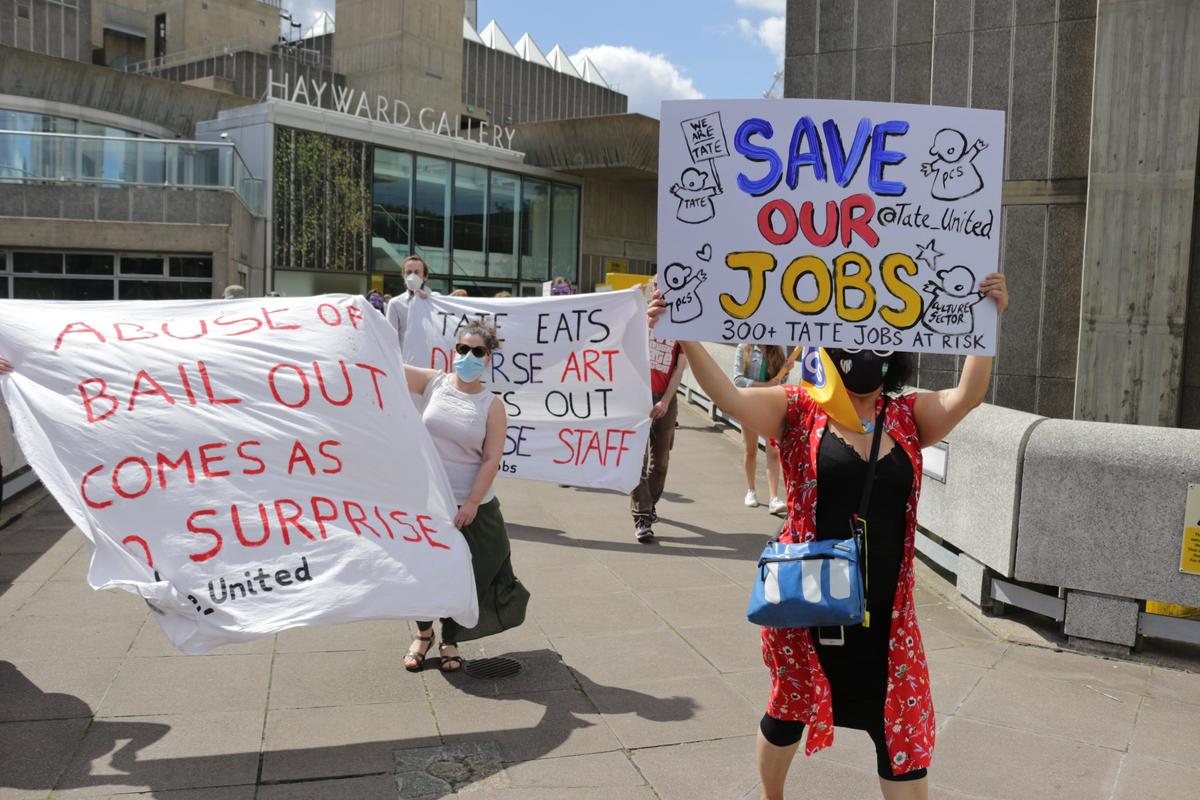Visitors to the Tate will have to walk past picket lines later this month after employees from Tate Enterprises, the gallery’s commercial arm, voted to take strike action in light of restructuring plans which could result in redundancies across the company.
Tate Enterprises, which operates retail, catering and publishing services across all of the Tate sites, is preparing to axe around 200 jobs this summer in a bid to stave off the financial fallout of the coronavirus pandemic.
The Public and Commercial Services Union (PCS) is campaigning for Tate, which owns Tate Enterprises Ltd, to step in and halt job losses at the company. A recent ballot on strike action held by the PCS resulted in an 88% yes vote. PCS says that more than 100 of its members will subsequently strike from 18 August; a Tate spokeswoman confirms that the strike will go ahead.
In a recent interview on BBC Radio 4 (Desert Island Discs), Tate director Maria Balshaw defended the restructure plans, adding that she has intervened and is consulting with staff regarding redundancies.
"We're almost unique in that we run all our own shops and cafes, and that means that everything that people experience at Tate reflects our values…. we are facing 50% fewer visitors coming to our galleries for probably quite a long time… sadly at the moment the trading business is too big," she said. Tate underlines that it has allocated £5m from its reserves to Tate Enterprises.
PCS also launched a consultative online strike ballot on 10 August at the Southbank Centre in London. The move comes after the centre, which includes the Hayward Gallery, announced plans to make up to 400 of its staff redundant in the wake of the coronavirus crisis.
PCS says that “the Southbank Centre has confirmed that it does not intend to pay its long-standing redundancy terms to the hundreds of staff currently at risk”, which will mean “the loss of thousands of pounds in redundancy payments”.
The Southbank Centre responded: "Our central aim in all of the decisions we’re making now is to preserve the centre’s future. We very much wish we could pay our existing company terms but we simply cannot afford it. We’ve made the decision to pay better terms to those staff who have worked with us for less than two years, so that everybody is compensated. If we didn't do this, those with less than two years service would get nothing. Unlike other arts organisations we have no casual staff, so most of our front of house colleagues will also receive redundancy terms. Paying our company terms would push us towards administration."
The union is subsequently “asking those members, particularly those still working at the Hayward Gallery and in other roles across the organisation, if they are prepared to take action in defence of their redundancy terms”. A PCS spokesman says that the Unite union also plans to join the ballot. “This will run online initially for around a week; we will then see if a statutory postal ballot is required,” he says.
PCS says it has called on the Southbank Centre to apply for the government’s £1.5bn cultural recovery fund to pay for jobs throughout the closure, and to preserve one of the countries “cultural crown jewels”. A spokeswoman for the Southbank Centre says: “We're waiting to see the loan scheme guidance so we can take an informed decision about applying to the fund.”
The programme of planned “brutal redundancies” was called out earlier this month in an open letter (#SouthbankSOS) which has since been signed by over 7,000 people including current and former employees. On 4 August, the senior leadership team at the Southbank Centre issued a detailed response, counteracting claims made in the letter.
Crucially, the signatories of #SouthbankSOS say that the cuts will disproportionately affect Bame (Black, Asian and minority ethnic) staff. But the Southbank response stresses that “our redundancy programme will be subject to an equality impact assessment. We will rebuild our organisation in the future with diversity and equality absolutely central to our recovery”.
A second #SouthbankSOS letter says that the Southbank leadership team’s statement leans “heavily on both distraction and denial, and does not attempt to address the core issues we raised in the letter”.


